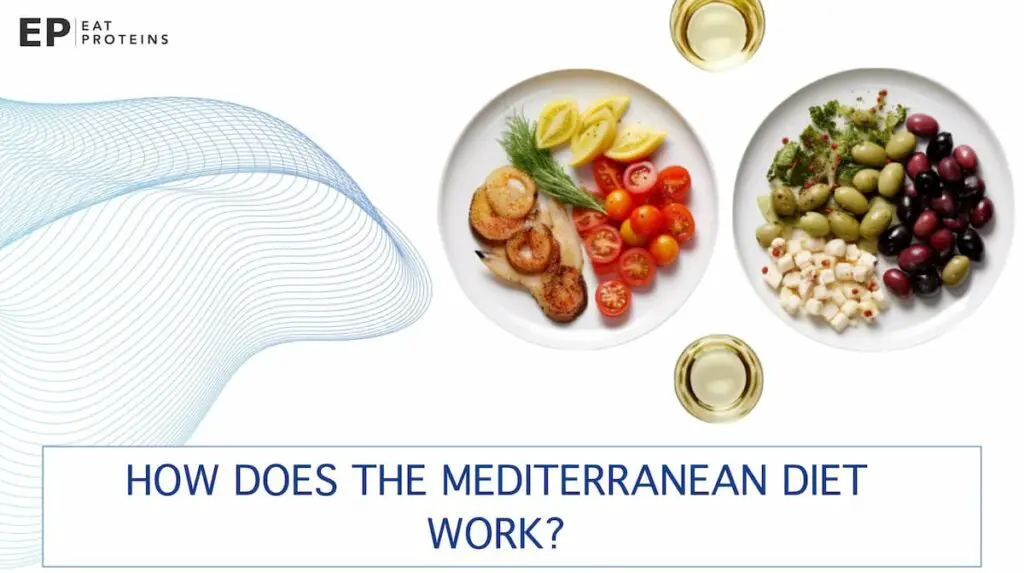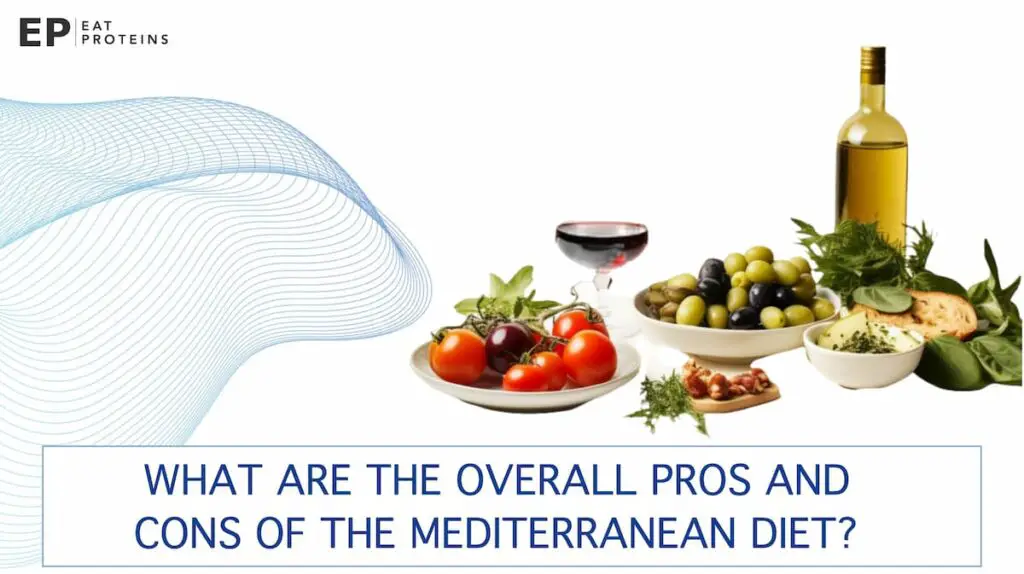The Mediterranean Diet, often referred to as the ‘Mediterranean ritual for weight loss,’ is a well-studied weight loss diet backed by 2021 research from M. Guasch-Ferré of the Harvard T.H. Chan School of Public Health. The Mediterranean Diet is known for its wide-ranging health benefits, including a 47% reduced risk of myocardial infarction and cardiovascular death, a 30% reduction in the risk of cardiovascular events, and a 30% lower risk of developing type 2 diabetes.
It emphasizes the consumption of unprocessed cereals, legumes, olive oil, fruits, and vegetables, and originates from the traditional eating habits of regions such as southern Spain, southern Italy, and Crete. UNESCO has recognized it as an intangible cultural heritage, a recognition that encompasses not only the food itself but also the skills, rituals, and traditions surrounding it.
The Mediterranean diet meal plan consists of a high intake of plant foods such as fruits, vegetables, whole grains, legumes, and nuts. It also includes moderate consumption of dairy products and poultry, as well as low to moderate intake of fish and red wine, which is typically consumed in moderation with meals. Red meat is limited in the Mediterranean diet meal plan. Olive oil serves as the primary source of fat, and the diet emphasizes the use of herbs and spices for flavoring instead of salt.
What is the Mediterranean Diet?
The Mediterranean diet refers to a dietary pattern characterized by a high intake of plant foods like tomatoes, spinach, and chickpeas; a moderate intake of dairy and meat such as chicken, fish, and lamb; and the consumption of olive oil and wine in moderation with meals. It emphasizes seasonal, locally grown, and minimally processed foods, including locally grown vegetables like zucchini, bell peppers, and eggplant.
What is the origin of the Mediterranean Diet?
The Mediterranean diet originated from the eating habits and traditional foods of regions such as southern Spain, southern Italy, and Crete. This diet emphasizes the consumption of unprocessed cereals, legumes, olive oil, fruits, and vegetables.
Also known as the ‘Mediterranean ritual diet,’ it has been recognized by UNESCO as an intangible cultural heritage. This recognition encompasses not just the food itself, but also the skills, rituals, and traditions surrounding it.
What is the purpose of the Mediterranean Diet?
The primary purpose of the Mediterranean Diet, like other weight loss diets, is to promote overall health and reduce the risk of chronic diseases, particularly cardiovascular disease.
Originating from a seminal report called the Seven Countries Study, the Mediterranean diet has been extensively researched over the years and is recognized for its wide-ranging health benefits, including potential advantages for metabolic syndrome, obesity, and cognitive decline.
How does the Mediterranean Diet work?
The Mediterranean Diet works by emphasizing the consumption of monounsaturated fats, like olive oil, along with fruits, vegetables, legumes, whole grains, and fish, while allowing for moderate alcohol intake, especially red wine.

The Mediterranean Diet has been shown to reduce the risk of cardiovascular disease mortality by approximately 50% in European populations, as evidenced by the Seven Countries Study conducted from 1958 to 1983. The diet’s effectiveness lies in its nutrient-rich, balanced approach, which has protective effects against chronic diseases.
How does the Mediterranean Diet work for weight loss?
The Mediterranean Diet is effective for weight loss. In a study conducted by Ancel Keys, an American physiologist, and his colleagues, individuals following the Mediterranean Diet experienced an average weight loss of 5-10% of their initial body weight over 2 years.
According to a 2011 meta-analysis study by Katherine Esposito from the Second University of Naples, adhering to the Mediterranean Diet resulted in a significant weight loss of approximately -1.75 kg and a reduction in body mass index by -0.57 kg/m² compared to control diets.
What are the overall pros and cons of the Mediterranean Diet?
The Mediterranean Diet offers numerous advantages, including a reduced risk of heart disease, stroke, obesity, and diabetes.

It promotes brain health and may help prevent cognitive decline and Alzheimer’s disease. Studies have shown that following the Mediterranean Diet can lead to a 30% reduction in stroke death rates and a decreased risk of type 2 diabetes. The nutrient-rich diet has multiple health benefits, making it a comprehensive approach to wellness.
Additionally, it benefits the environment by reducing greenhouse gas emissions. However, there are some disadvantages, such as the potential for weight gain if high-caloric foods like olive oil and nuts are overconsumed.
What are the benefits of the Mediterranean Diet?
The Mediterranean diet has numerous benefits for overall health and disease prevention. A 2017 study by Valeria Tosti from Washington University has shown that adhering to this diet can result in a 30% reduction in cardiovascular disease risk and a 23% lower rate of all-cause mortality.
Consuming 5 servings of nuts per week can decrease the risk of coronary heart disease events by 40-60%. Additionally, the high intake of water-soluble fiber in the Mediterranean diet can lower LDL cholesterol concentrations by approximately 1.12 mg/L. This graph shows the benefits of the Mediterranean Diet.
What are the Mediterranean Diet benefits for fat loss?
The Mediterranean Diet’s benefits for fat loss are backed by a 2003 study by R Kaaks from the International Agency for Research on Cancer, which found that the Mediterranean Diet led to significant reductions in body weight and waist circumference among postmenopausal women.
Why am I not losing weight on the Mediterranean Diet?
If you’re not losing weight on the Mediterranean Diet, there could be several factors at play, such as not maintaining a calorie deficit, which is essential for weight loss. Another reason could be the overconsumption of healthy but calorie-dense foods like olive oil, nuts, and whole grains which are staples in the Mediterranean Diet.
Additionally, lack of physical activity could also contribute to a weight loss plateau, as the Mediterranean lifestyle not only focuses on diet but also on being physically active.
What are the side effects of the Mediterranean Diet?
The Mediterranean Diet is generally safe and beneficial for health, but there are potential side effects to consider. Overconsumption of calorie-dense foods like olive oil and nuts may lead to weight gain, and individuals with celiac disease or lactose intolerance could experience stomach issues due to certain foods in the diet.
Consulting with a healthcare provider or dietitian is advised to ensure the Mediterranean Diet meal plan is appropriate for your individual needs and health conditions.
How to do the Mediterranean diet
This list provides detailed instructions on how to follow the Mediterranean diet.

- Focus on consuming a high intake of plant foods, olive oil, moderate dairy, low red meat, nuts, and a moderate intake of red wine during meals.
- Include a variety of plant foods such as vegetables, legumes, whole grains, fruits, and nuts in your daily meals.
- Replace unhealthy fats, such as saturated fats, with heart-healthy fats like olive oil and nuts.
- Limit your consumption of red meat and opt for lean sources of protein like fish, poultry, and plant-based protein sources.
- Incorporate moderate amounts of dairy products, preferably low-fat options like yogurt and cheese.
- Enjoy meals with family and friends, following the Mediterranean tradition of socializing and sharing food.
- Include physical activity in your daily routine, such as walking, cycling, or engaging in other forms of exercise.
- Drink red wine in moderation, if desired, but avoid excessive alcohol consumption.
- Stay hydrated by drinking plenty of water and limiting sugary beverages.
What foods can you eat on the Mediterranean Diet?
The Mediterranean Diet includes a high intake of plant foods, olive oil, moderate dairy, low red meat, and wine in moderation.
- Olive Oil
- Fresh Fruits
- Whole Grains
- Fish
- Legumes
- Nuts and Seeds
- Vegetables
- Moderate Wine Consumption
- Low Red Meat
- Low Dairy
- Herbs and Spices
What foods are restricted from the Mediterranean Diet menu?
The following foods should be restricted from the Mediterranean Diet menu.
- Red Meat
- Processed Foods
- Refined Sugars
- Soda and Sugary Drinks
- Trans Fats
- High Sodium Snacks
- Fast Food
- Pre-packaged Meals
What is the Mediterranean Diet meal plan?
The Mediterranean Diet meal plan focuses on a high intake of fruits and vegetables, providing 7-10 servings per day of essential vitamins, minerals, and antioxidants that benefit cardiovascular health.
It includes 3-4 servings per day of whole grains rich in fiber and nutrients, which contribute to weight management and reduce the risk of heart disease by up to 30%. The diet also allocates 30-35% of total daily calories to healthy fats, mainly from olive oil and nuts, which have been proven to lower bad cholesterol levels by 10-15%.
What are the breakfast options on a Mediterranean Diet meal plan?
The breakfast options on a Mediterranean Diet meal plan range from carbohydrate-rich choices like a bowl of Greek yogurt with fresh berries and a drizzle of honey, or a serving of oatmeal topped with sliced almonds and Greek yogurt, to protein-focused options like a vegetable omelet featuring eggs, spinach, tomatoes, and feta cheese.
The diet also allows for a Mediterranean-style frittata made with eggs, bell peppers, onions, and olives, providing a balanced mix of carbohydrates and proteins.
This photo shows a Mediterranean diet breakfast recipe, which includes a Mediterranean-style smoothie containing Greek yogurt, spinach, cucumber, and banana.
What are the best low-carb alcohol options for a Mediterranean Diet?
The best low-carb alcohol options for a Mediterranean Diet include consuming moderate amounts of red wine, which typically contains around 12-14% alcohol by volume, with the recommended intake being 1-2 glasses per day for men and 1 glass per day for women. However, according to a 2021 study by Celestino Santos-Buelga titled ‘Wine, Polyphenols, and Mediterranean Diets,’ excessive alcohol consumption can have negative health effects.
What are the best Mediterranean Diet recipes?
The best Mediterranean Diet recipes focus on fresh, whole foods and include a range of options from Greek Salad, which combines chopped tomatoes, cucumbers, red onions, Kalamata olives, and feta cheese, to Lemon Garlic Roasted Chicken, featuring a marinade of olive oil, lemon juice, minced garlic, and herbs.

For breakfast, a Mediterranean Breakfast Bowl can be made by layering Greek yogurt with sliced bananas, berries, a handful of almonds, and a drizzle of honey. These recipes exemplify the diet’s emphasis on fruits, vegetables, whole grains, and lean proteins, all seasoned with flavorful ingredients like olive oil and herbs.
What are the best Mediterranean Diet recipes for beginners?
The best Mediterranean Diet recipes for beginners are easy, one-pot meals that require minimal ingredients and steps, such as a simple vegetable stir-fry cooked on the stovetop or a quick no-bake Greek salad.
Utilize time-saving hacks like pre-cut vegetables and quick-cooking grains, and plan your grocery list to fit a budget. Make sure to pay attention to portion sizes and nutritional values, especially if you’re aiming for low-calorie or vegetarian options, to align with your health goals.
What are essential Mediterranean Diet groceries for beginners?
The following list includes 12 staple products that are commonly used in a Mediterranean Diet shopping list.
- Olive Oil
- Whole Grain Bread
- Fresh Vegetables (e.g., tomatoes, bell peppers, and zucchini)
- Fresh Fruits (e.g., oranges, apples, and berries)
- Legumes (e.g., lentils, chickpeas)
- Nuts and Seeds (e.g., almonds, walnuts)
- Fish (e.g., salmon, mackerel)
- Poultry (e.g., chicken, turkey)
- Whole Grains (e.g., quinoa, brown rice)
- Dairy (e.g., Greek yogurt, feta cheese)
- Herbs and Spices (e.g., oregano, basil)
- Red Wine (optional)
What is Mediterranean Diet meal delivery?
A Mediterranean Diet meal delivery refers to a meal delivery service that offers meal plans and dishes that adhere to the principles and ingredients of the Mediterranean diet, which emphasizes whole foods, lean proteins, healthy fats, and plenty of fruits and vegetables.
The best Mediterranean Diet meal delivery services, based on our research and evaluation, are Factor Meals, Green Chef, Clean Eatz Kitchen, HelloFresh, and Thrive Market.
What are the Mediterranean-friendly restaurants?
A Mediterranean-friendly restaurant refers to an establishment that offers menu items in line with the principles of the Mediterranean diet, which emphasizes whole foods, lean proteins, healthy fats, and fresh vegetables.
The Mediterranean-friendly restaurant chains include Applebee’s, TGI Fridays, Outback Steakhouse, Panera, Ruby Tuesday, Red Lobster, Panda Express, Bonefish Grill, P.F. Changs, Olive Garden, Carrabba’s, Chick-fil-A, Boston Market, Denny’s, Pret a Manger, Starbucks, Long John Silver’s, Texas Roadhouse, Longhorn Steakhouse, IHOP, Cracker Barrel, BJ’s Restaurant and Brewhouse, Cheesecake Factory, Jason’s Deli, Bob Evan’s, Chili’s, Perkins, McDonald’s, Caribou Coffee, and Joe’s Crab Shack.
What are the food delivery apps for a Mediterranean Diet?
Food delivery apps for the Mediterranean Diet are specialized mobile applications that allow users to order Mediterranean-friendly groceries and meals from affiliated stores and eateries.
These apps provide functionalities like real-time GPS tracking, estimated delivery timelines, and a varied menu curated to suit the Mediterranean Diet’s emphasis on fruits, vegetables, whole grains, and lean proteins. Top-rated food delivery apps for the Mediterranean Diet, as per customer reviews, include Grubhub, Uber Eats, DoorDash, Gopuff, ChowNow, Seamless, and Postmates.
What are the Mediterranean Diet apps?
Mediterranean Diet apps are specialized mobile applications designed to assist users in meal planning, calorie tracking, and grocery shopping tailored to the Mediterranean Diet’s focus on fresh, balanced ingredients.
The best Mediterranean Diet apps, based on user ratings and features, include ‘Mediterranean Diet Plan’ for its extensive library of over 50 recipes and real-time calorie tracking, ‘MyFitnessPal’ which offers a Mediterranean Diet filter among its dietary options and tracks over 30 nutrients, and ‘Paprika Recipe Manager 3’ that provides advanced meal planning features and the ability to import Mediterranean recipes from various online sources.
What are the best Mediterranean Diet apps for beginners?
The best Mediterranean Diet apps for beginners are the “Mediterranean Diet & Meal Plan” app, which offers premade meal plans and simplifies grocery shopping; the “Mediterranean Diet Tracker” app, which provides educational information and meal logging charts; and the “Kuri: Recipes & Meal Planning” app, offering over 700 Mediterranean diet recipes and personalized meal planning options.
Should you count calories on a Mediterranean Diet?
Yes, you should count calories on the Mediterranean Diet if your goal is to lose weight. A 2020 study by Paromita Banerjee from the Indian Council for Medical Research has shown that calorie-counting apps are effective in aiding weight loss. The study reported a mean app quality score of 36.95 out of 55, indicating that calorie counting can enhance the diet’s effectiveness for weight loss and promote healthier eating habits.
How many calories should I eat on a Mediterranean Diet?
On the Mediterranean Diet, women should aim for 1,500 to 1,800 calories per day, and men should target 1,800 to 2,200 calories per day. To achieve weight loss of 1-2 pounds per week, aim for an energy deficit of 500-1,000 calories per day, as supported by a 2021 study by Ju Young Kim from Seoul National University Bundang Hospital.
How many carbs are on the Mediterranean Diet meal plan?
The Mediterranean diet meal plan, as outlined in a 2021 study published in the Journal of Internal Medicine, generally consists of carbohydrates contributing to approximately 45-60% of total calorie intake.
For a man who eats 2,200 calories per day following the Mediterranean Diet, approximately 990 to 1,320 calories could come from carbohydrates, whereas for a woman who eats 1,500 calories per day on the same diet, approximately 675 to 900 calories would be sourced from carbohydrates.
What other diets are similar to the Mediterranean Diet?
The DASH Diet (Dietary Approaches to Stop Hypertension), the Nordic Diet, and the Flexitarian Diet are similar to the Mediterranean Diet in various aspects such as high fruit consumption, a focus on vegetables, and the inclusion of whole grains.
These diets also prioritize lean proteins, limit saturated fats, and encourage the use of healthy fats like those found in olive oil and nuts. Additionally, they advocate for moderate dairy consumption, limited added sugars, and the use of herbs and spices for flavoring, much like the Mediterranean Diet.
What is the difference between the Mediterranean Diet and the DASH Diet?
The Mediterranean Diet and the DASH Diet both emphasize the consumption of fruits, vegetables, whole grains, and lean proteins, but they differ in their primary objectives and specific food recommendations.
The Mediterranean Diet focuses on a broader lifestyle approach, advocating for the use of olive oil as a primary fat source and allowing for moderate consumption of red wine, whereas the DASH Diet is specifically tailored to lower blood pressure and emphasizes low sodium and high nutrient intake.
